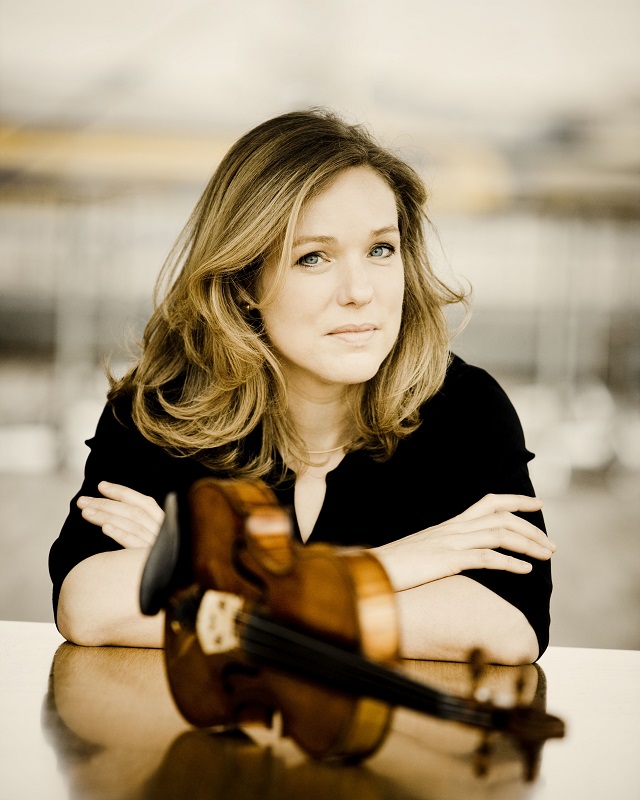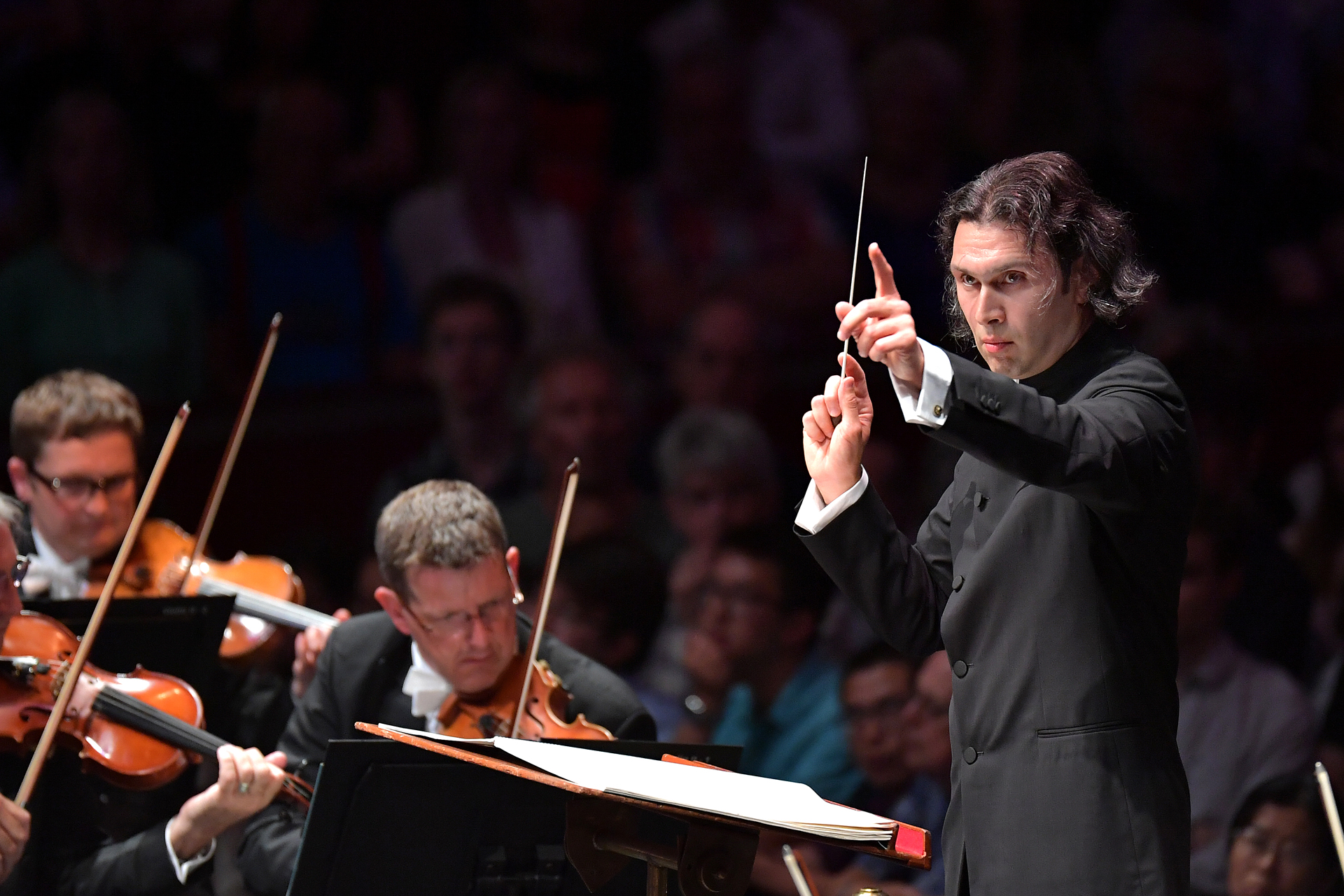Van Keulen, LPO, Jurowski, Royal Festival Hall | reviews, news & interviews
Van Keulen, LPO, Jurowski, Royal Festival Hall
Van Keulen, LPO, Jurowski, Royal Festival Hall
Mourning and heavy-footed satire in a tough but rewarding programme
Readers might be wondering how often the spectre of Trump is destined to loom in reviews.
There were only glimmers of transcendence in a programme which put frozen mourning and depression highest on the list. Not a great deal of contrast, then, but plenty of connections in the keening stepwise intervals of Georgian old master Giya Kancheli's Mourned by the Wind "for orchestra and solo viola" (note the order), Martinů's Memorial to the Nazi-massacred inhabitants of Czech Lidice and the Vaughan Williams symphony, the first movement of which starts and ends with the very same low-register heavings as the Martinů.
 Kancheli's elegiac Liturgy, as it is subtitled, inhabits a world all its own, a static one in which insistent threnody, launched on the cusp of audibility by the wonderful Isabelle van Keulen (pictured right by Marco Borggreve), meets very selective orchestral thrashes but goes its hallowed way with minute adjustments of instrumental colour which always hold the ear; not minimalism by any means, but certainly minimalistic. From pianist Catherine Edwards's shocking initial gesture via a late requiem of trombones to the final halo of strings, this was a masterclass in perfectly-placed sonorities, van Keulen and Jurowski between them judging the intensity of the silences to equally powerful effect. The 81-year-old composer was enthusiastically received; hard by then to grudge the concert's late start as Georgians and other guests drifted into the hall at the beginning.
Kancheli's elegiac Liturgy, as it is subtitled, inhabits a world all its own, a static one in which insistent threnody, launched on the cusp of audibility by the wonderful Isabelle van Keulen (pictured right by Marco Borggreve), meets very selective orchestral thrashes but goes its hallowed way with minute adjustments of instrumental colour which always hold the ear; not minimalism by any means, but certainly minimalistic. From pianist Catherine Edwards's shocking initial gesture via a late requiem of trombones to the final halo of strings, this was a masterclass in perfectly-placed sonorities, van Keulen and Jurowski between them judging the intensity of the silences to equally powerful effect. The 81-year-old composer was enthusiastically received; hard by then to grudge the concert's late start as Georgians and other guests drifted into the hall at the beginning.
Even though Kancheli has many more things to say after the mid-point – eerie waltz and shadowy chromatic figures from the viola included – it could have stopped there. Martinů in his public memorial knows how to say so much in a mere eight minutes. Certainly this isn't as mobile or as chameleonic a work as any of the six symphonic masterpieces – I'm still reeling from last Saturday's searing performance of the Fantaisies Symphoniques under Jakub Hrůša in Bamberg – but it carves its arch effectively in marble, and Jurowski, sometimes criticised for objective distancing, urged the unstinting intensity of the strings as they briefly soar in the native idiom Martinů never forgot during his painful exile.
Jurowski (pictured below by Chris Christodoulou at last year's Proms) could also have applied his usual spring-heeled precision to Vaughan Williams's riveting swansong. But he chose instead to underline the heavy-heartedness broken up only by lyric laments in the first movement – clarinets and harp, later solo violin (guest leader Kevin Lin, soulful) – and the savage parades of the symphony's weird and frightening interior. The three saxophones were paramount here, reminding us how Vaughan Williams had much earlier used the timbre to make a smarmy horror of Job's comforters in his Biblical ballet. Niall Keatley's flugelhorn only briefly suggested air from another planet.
This is certainly not territory totally unknown to earlier VW works; the composer was savage in the 1930s and '40s, too. I'll never forget a Royal Philharmonic concert including the furious Fourth Symphony advertised as "Green and Pleasant Land" – and the Ninth treads even more desolate landscapes (Salisbury Plain and Stonehenge were suggested in the composer's soon-to-be-suppressed initial programme of the closing stages in Hardy's Tess of the D'Urbervilles).
Only passing moments of human compassion lighten the canvas. But decidedly the mood is more depressed and barely relieved by an irony that verges on the extremes of Shostakovich's Eighth Symphony, or by a more open-hearted song which is absolutely the composer's own personal domain. Jurowski kept the discipline in the embattled unisons, but didn't try to lift the gloom. Not even the parting of the clouds announced by swirls of harps before the calm final bars reveals anything truly comforting. Strange, unlike anything else: a unique voice in music, realised with perfect mastery.
rating
Explore topics
Share this article
more Classical music
 Ridout, Włoszczowska, Crawford, Lai, Posner, Wigmore Hall review - electrifying teamwork
High-voltage Mozart and Schoenberg, blended Brahms, in a fascinating programme
Ridout, Włoszczowska, Crawford, Lai, Posner, Wigmore Hall review - electrifying teamwork
High-voltage Mozart and Schoenberg, blended Brahms, in a fascinating programme
 Sabine Devieilhe, Mathieu Pordoy, Wigmore Hall review - enchantment in Mozart and Strauss
Leading French soprano shines beyond diva excess
Sabine Devieilhe, Mathieu Pordoy, Wigmore Hall review - enchantment in Mozart and Strauss
Leading French soprano shines beyond diva excess
 Špaček, BBC Philharmonic, Bihlmaier, Bridgewater Hall, Manchester review - three flavours of Vienna
Close attention, careful balancing, flowing phrasing and clear contrast
Špaček, BBC Philharmonic, Bihlmaier, Bridgewater Hall, Manchester review - three flavours of Vienna
Close attention, careful balancing, flowing phrasing and clear contrast
 Watts, BBC Symphony Orchestra and Chorus, Bignamini, Barbican review - blazing French masterpieces
Poulenc’s Gloria and Berlioz’s 'Symphonie fantastique' on fire
Watts, BBC Symphony Orchestra and Chorus, Bignamini, Barbican review - blazing French masterpieces
Poulenc’s Gloria and Berlioz’s 'Symphonie fantastique' on fire
 Bell, Perahia, ASMF Chamber Ensemble, Wigmore Hall review - joy in teamwork
A great pianist re-emerges in Schumann, but Beamish and Mendelssohn take the palm
Bell, Perahia, ASMF Chamber Ensemble, Wigmore Hall review - joy in teamwork
A great pianist re-emerges in Schumann, but Beamish and Mendelssohn take the palm
 First Persons: composers Colin Alexander and Héloïse Werner on fantasy in guided improvisation
On five new works allowing an element of freedom in the performance
First Persons: composers Colin Alexander and Héloïse Werner on fantasy in guided improvisation
On five new works allowing an element of freedom in the performance
 First Person: Leeds Lieder Festival director and pianist Joseph Middleton on a beloved organisation back from the brink
Arts Council funding restored after the blow of 2023, new paths are being forged
First Person: Leeds Lieder Festival director and pianist Joseph Middleton on a beloved organisation back from the brink
Arts Council funding restored after the blow of 2023, new paths are being forged
 Classical CDs: Nymphs, magots and buckgoats
Epic symphonies, popular music from 17th century London and an engrossing tribute to a great Spanish pianist
Classical CDs: Nymphs, magots and buckgoats
Epic symphonies, popular music from 17th century London and an engrossing tribute to a great Spanish pianist
 Sheku Kanneh-Mason, Philharmonia Chorus, RPO, Petrenko, RFH review - poetic cello, blazing chorus
Atmospheric Elgar and Weinberg, but Rachmaninov's 'The Bells' takes the palm
Sheku Kanneh-Mason, Philharmonia Chorus, RPO, Petrenko, RFH review - poetic cello, blazing chorus
Atmospheric Elgar and Weinberg, but Rachmaninov's 'The Bells' takes the palm
 Daphnis et Chloé, Tenebrae, LSO, Pappano, Barbican review - lighting up Ravel’s ‘choreographic symphony’
All details outstanding in the lavish canvas of a giant masterpiece
Daphnis et Chloé, Tenebrae, LSO, Pappano, Barbican review - lighting up Ravel’s ‘choreographic symphony’
All details outstanding in the lavish canvas of a giant masterpiece
 Goldscheider, Spence, Britten Sinfonia, Milton Court review - heroic evening songs and a jolly horn ramble
Direct, cheerful new concerto by Huw Watkins, but the programme didn’t quite cohere
Goldscheider, Spence, Britten Sinfonia, Milton Court review - heroic evening songs and a jolly horn ramble
Direct, cheerful new concerto by Huw Watkins, but the programme didn’t quite cohere
 Marwood, Power, Watkins, Hallé, Adès, Bridgewater Hall, Manchester review - sonic adventure and luxuriance
Premiere of a mesmeric piece from composer Oliver Leith
Marwood, Power, Watkins, Hallé, Adès, Bridgewater Hall, Manchester review - sonic adventure and luxuriance
Premiere of a mesmeric piece from composer Oliver Leith


Add comment